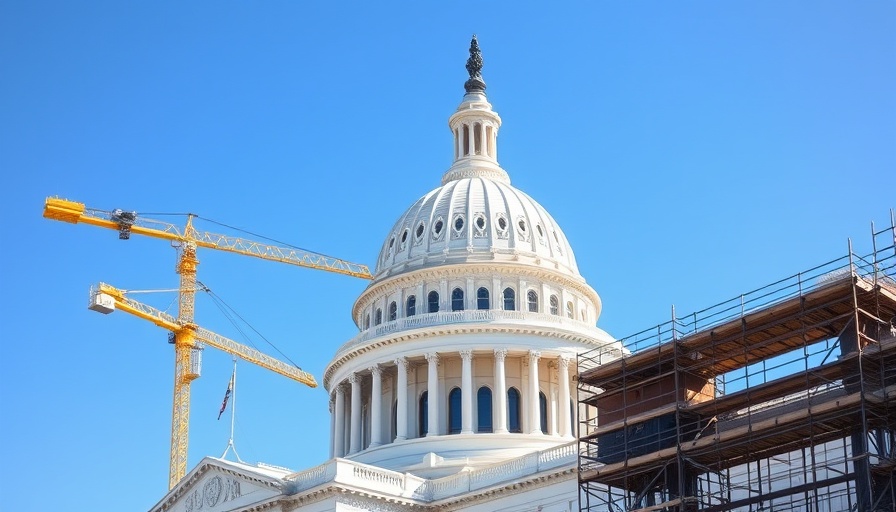
What’s Behind California’s Capitol Annex Project?
In recent years, California's Capitol annex project has emerged as a striking example of government inefficiency. Skewed costs and an underlying culture of secrecy have raised eyebrows, leading many to question how taxpayer money is being spent. The Capitol annex, a billion-dollar endeavor meant to modernize the state government’s facilities, has faced a series of costly delays and unexpected budget overruns. As residents of Bakersfield and across the state grapple with their own financial constraints, the mismanagement of such a sizable investment is not just an abstract issue—it’s about accountability, transparency, and the ethical use of public funds.
The Impact on Communities
Local residents, especially those in Bakersfield, may wonder what this project holds for their future. As the state prioritizes this expensive infrastructure, vital community programs often remain underfunded. Public services like education and healthcare bear the brunt when funds are diverted to cover overruns and delays.
The situation amplifies feelings of disenfranchisement among citizens who see their needs overshadowed by ambitious state projects that don’t deliver as promised. Understanding the implications of such financial decisions can empower communities to advocate for better accountability in government contracts.
Historical Context of State Spending
With a history rich in infrastructure projects, California has also experienced its fair share of scandals involving public spending. The Capitol annex project isn’t an isolated incident; it is part of a broader narrative about mismanagement in state spending, particularly when it comes to large projects. The combination of bureaucratic delays and poor planning has typically led to significant cost overruns, an issue that taxpayers have been left to absorb. In light of this history, scrutiny of the Capitol annex is not just warranted, but necessary.
The Secrecy Factor: Why It Matters
As the project's budget has ballooned, so has the air of secrecy surrounding its status. An audit revealed that the California Department of General Services initially withheld critical information about the project’s progress and expenses. This secrecy can lead to mistrust and skepticism among the very citizens who are supposed to benefit from such initiatives.
The lack of transparency complicates the ability of state officials to communicate effectively with taxpayers. Clear and open channels of communication are essential for rebuilding that trust and ensuring that public investment meets the needs of all Californians.
Future Predictions: What’s Next?
Looking ahead, there are critical lessons to be learned from the Capitol annex project. Government accountability and public trust hinge on how effectively this issue is addressed. Lawmakers must prioritize transparency in ongoing and future projects. The adoption of open data policies could be a crucial step towards ensuring that taxpayers have access to regular updates, spending reports, and project checkpoints.
This move would not only enhance public trust but would also serve as a deterrent against the mismanagement seen in the current endeavor. Reforming project oversight mechanisms can ultimately set a precedent for future governance.
Demands for Accountability: How Citizens Can Act
It can be easy for residents to feel powerless in the face of bureaucratic inefficiencies. However, understanding that your voice matters can instill a sense of empowerment. Citizens are encouraged to engage with local representatives about their concerns regarding public investments. Writing letters, attending town hall meetings, and utilizing platforms for community advocacy can make a significant difference.
Widespread public engagement not only pressures state officials to prioritize accountability but may also lead to reforms that can prevent future misallocation of taxpayer dollars.
The ongoing turmoil surrounding the California Capitol annex project serves as a reminder of the need for vigilance in public spending. As we reflect on these challenges, it becomes imperative for communities across California, including those in Bakersfield, to stand united in advocating for more responsible governance. Understanding the intricacies of such projects is a crucial first step in fostering change and ensuring that our tax dollars are spent wisely.
Take Action for a Transparent Tomorrow
As this story unfolds, it’s vital for all community members to stay informed and engaged. Contact your local representatives, demand better transparency in state projects, and participate in discussions that hold officials accountable. It’s time for the citizens of Bakersfield and all Californians to stand up for their rights and ensure that public spending serves the community effectively.
 Add Row
Add Row  Add
Add 



Write A Comment